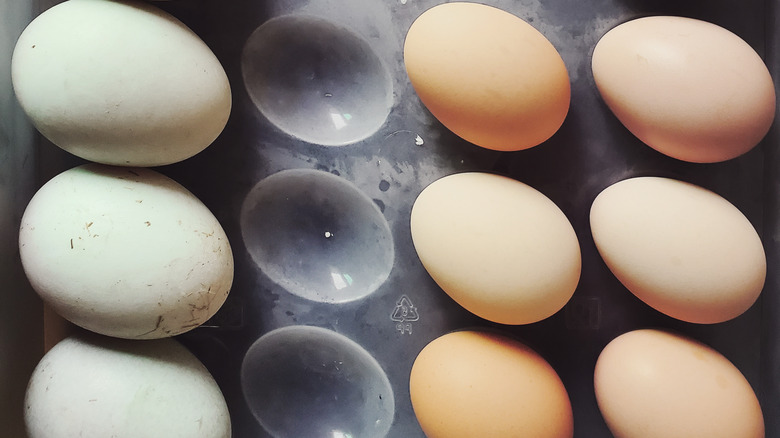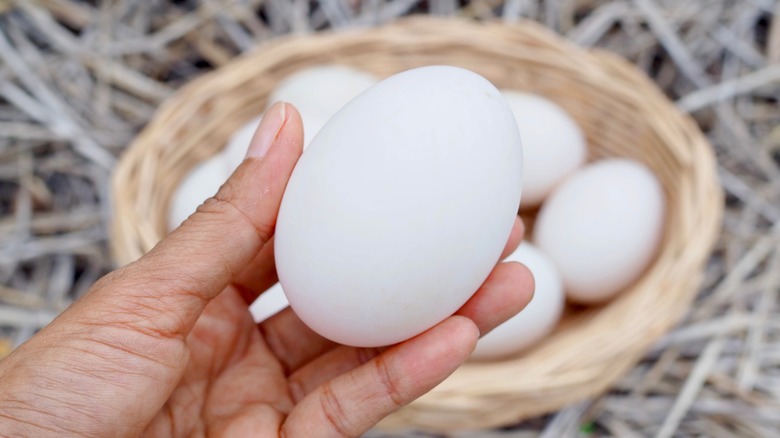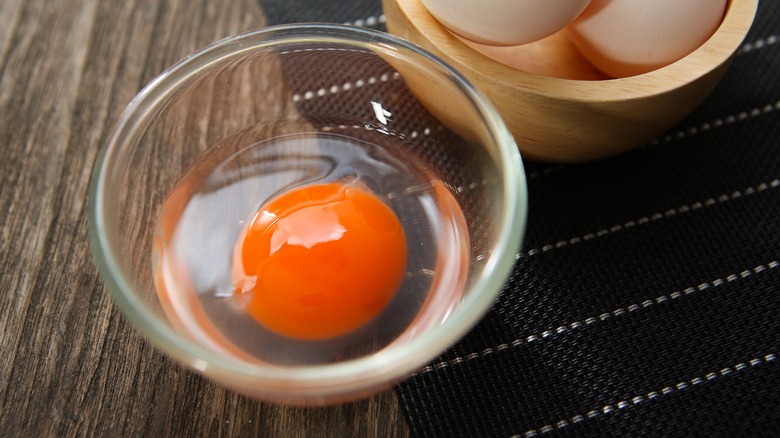Chicken Vs Duck Eggs: What's The Flavor Difference?
If it looks like a duck egg, walks like a duck egg, and quacks like a duck egg ... it could be a chicken egg. While chicken and duck eggs don't look identical, there are only slight cosmetic differences between the two. If you lay them out (pun intended) side-by-side, the most obvious discrepancy is the larger size of the duck egg, and maybe some colored speckles on the shell. However, when it comes to flavor, there is a much bigger variance to be aware of, especially if you plan on swapping duck eggs into a recipe that calls for regular old chicken eggs.
The difference in taste between chicken and duck eggs isn't nearly as drastic as the differences in the animals' meat, but duck eggs have a richer flavor and tend to have a creamier and thicker texture when cooked. They're considered a delicacy in many cultures, and some people also describe the taste as being like a chicken egg, but stronger — i.e., more intense and "eggy."
Ducks lay eggs all year round, while chickens usually stop production in the colder months. In the U.S., it's not very common to come across duck eggs often on grocery store shelves, but if you're curious about trying them, farmers' markets and specialty stores are more likely to carry a dozen or two. But before you get cracking, there are some other things to know about these special eggs, and how to enjoy them to their fullest.
Other duck egg differences
Ducks eggs may be up to 50 to 100% bigger than a chicken's, so keep in mind that a that a three-egg omelet, for instance, might become a four-and-a-half to six-egg one if you use the duck variety. Duck eggs also have a longer shelf life because they have a thicker shell and membrane (they're also tougher to crack for this reason).
You'll mostly see white duck eggs sold in stores, but they do come in other colors, including shades of blue, gray, green, and even black. The yolks of duck eggs are also a deeper, more golden to orange color than chicken ones. That beautiful, rich yolk is responsible for the extra creaminess in texture when they're cooked. And because they're larger, duck eggs contain more of just about everything — calories, fat, protein, and nutrients — than chicken eggs do.
One bonus of duck eggs is that they're usually safe to eat for people who are sensitive or allergic to chicken eggs. This is due to the differing protein structures between the two. The downsides are that duck eggs carry a higher price point, so you definitely don't want to mess up and use them improperly when cooking or baking.
Size matters when cooking and baking with duck eggs
Duck eggs can generally be cooked in the same ways as chicken eggs, save for a few adjustments. If you're making a simple scramble or omelet, there will be no difference between the two, other than the slightly richer taste and larger yield. You may need to add a minute or two to the cook time and an extra pinch of seasoning to account for the larger volume. To get more adventurous, try making fried duck eggs with blood sausage, or swapping in duck eggs for an even silkier egg drop soup.
However, in more convoluted recipes, duck and chicken eggs are not a one-for-one swap — especially when baking. Baking is a science, and discrepancies with the ingredients can cause a dessert disaster. A general rule is that one large chicken egg produces just over three tablespoons of liquid when beaten, and one yolk is equal to one tablespoon. Duck eggs, meanwhile, have a large volume of yolk compared to the white. You can pull out a scale and try to weigh your duck eggs and yolks to get amounts close to what you'd find in chicken eggs.
That being said, there are factors you can't account for, such as recipes not specifying what size of eggs to use. In that case, going with duck eggs will definitely throw your baked goods off. It's best to stick to simple recipes that are written specifically for duck eggs, or ones where size isn't an issue.



